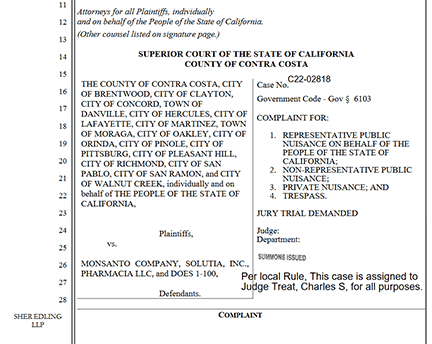Martinez, CA – The County of Contra Costa, along with 17 towns and cities, filed a lawsuit to hold Monsanto Corporation and two other companies accountable for the enormous costs the County and the municipalities are incurring to remove polychlorinated biphenyls (PCBs) contamination from their jurisdictions, the San Francisco Bay, and the western Sacramento-San Joaquin River Delta.
Joining the county as plaintiffs in the lawsuit are the Cities of Brentwood, Clayton, Concord, Hercules, Lafayette, Martinez, Oakley, Orinda, Pinole, Pittsburg, Pleasant Hill, Richmond, San Pablo, San Ramon, and Walnut Creek, and the Towns of Danville and Moraga. In addition to Monsanto Company, the lawsuit names Solutia, Inc. and Pharmacia LLC as Defendants. The complaint was filed in the Superior Court of California, Contra Costa County.
The lawsuit includes claims of public nuisance, private nuisance, and trespass. It adds to a growing list of similar lawsuits filed around the United States alleging that Monsanto has known about the public health and environmental threats caused by PCBs for more than 50 years. Across the country, plaintiffs allege that Monsanto deliberately misled the public, environmental regulators, and its own customers so it could reap massive profits from PCB sales.
“Our courts provide a level playing field so that local communities like these can take on powerful polluters like Monsanto,” said Paul Stephan of Sher Edling LLP, outside counsel supporting the local governments in this matter. “This case is an important part of protecting the health and quality of life for residents, businesses, and communities throughout the county.”
Monsanto produced nearly 99 percent of all PCBs used in the United States beginning in the 1930s and continued until the manufacture of PCBs was banned by the Toxic Substance Control Act of 1976. According to Monsanto’s own internal documents, company officials knew and were warned about the dangers to human health and the environment from PCBs.
PCB contamination is already widespread across the Delta and the Bay Area. The San Francisco Bay Regional Water Quality Control Board has identified certain parts of the Bay, including Peyton Slough, as “hot spots” where PCB concentrations in sediment are multiple orders of magnitude higher than elsewhere in the bay. PCB contamination in the bay has been so severe that the California Office of Environmental Health Hazard Assessment has advised some people not to eat certain types of fish caught in the bay. For example, children and women aged 18 to 49 are advised not to eat striped bass, sharks, and white sturgeon caught in the bay. Everyone is also advised not to eat the skin and fatty tissue of any fish caught in the bay.
Water and sediment containing PCBs end up in the county’s and municipalities’ wastewater and stormwater systems, which eventually make their way into the western Sacramento-San Joaquin River Delta and San Francisco Bay. In order to comply with stringent regulations to prevent further contamination, the plaintiffs must implement a wide range of expensive actions.
The County and cities are represented by their own staff attorneys, with support of outside counsel Sher Edling LLP of San Francisco. Sher Edling also supports the Counties of Marin and San Mateo, and municipalities within those counties, in similar litigation. The complaint was initially submitted on December 21, 2022, is now officially recorded as on file, and is available here.

